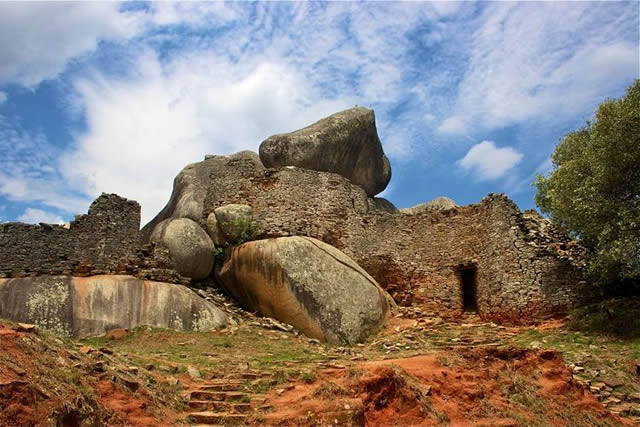Let’s make our Zim-Asset work


Zimbabwe is blessed with tourist attraction areas like the Great Zimbabwe Ruins of which it is one of the assets which can propel our economy
Dr Gift Mugano
Like other African countries, Zimbabwe has not fully utilised its resources since independence to unleash its potential. Today, every Zimbabwean is frustrated by the state of play in our economy. My message today is that let us make our Zimbabwe assets work. Zimbabwe assets discussed here range from human capital, land, natural resources, good geography and of course reasonably good infrastructure base.In terms of human capital, Zimbabwe is renowned for highly skilled personnel who are not only educated but also versatile and hard working. These are rare attributes which has made us genius both at a local level and in foreign land.
This came into being due to Government’s aggressive support towards education — a move the Government maintained since independence. We must applaud Government for that.
However, human capital is like seed. We all know that no matter how good the seed is it cannot germinate, grow and give bumper harvest if it is not grown on fertile soils, watered and weeded.
Our environment, characterised by high unemployment (formal), disappearing of formal enterprises with an ever growing informal sector and generally subdued business activities inter alia has made it very difficult for our graduates and existing professionals to showcase their skills. This is clearly the opposite of the countries who receive of professionals. This the reason why they excel outside most probably more than they do here.
If we want to utilise this asset, human capital, we need to continue to work hard in creating business environment which make it easy for people to invest here.
What we need more than anything else now is foreign direct investments (FDI). We must always endeavour to remove all the bottlenecks which are inhibiting FDIs.
In 1970, South Korea had dominant agricultural sector, with no capital formation in agricultural sector, abundant labour, poor natural resources, small private sector, weak technology base and low per capital income ($69-70).
The Korean government had successive five-year plans which were aimed at creating a conducive for FDIs and of course unleashing the potential in its human capital.
The South Korean economy shifted from agriculture to manufacturing. Exports rose from $100 million in 1964 to exports exceeded to $1 billion 1971 and exports exceeded $10 billion 1977.
Between 1960 and 2008, exports increased by 14 000 times while foreign reserves shot up by 1 300 times.
South Korea is first in the world in Ship Building with 35,2 percent of world production followed by Japan with 29 percent. It is again first in DRAM making with 48,5 percent of world production. She is fifth both in automobile production with 5,5 percent of the world output and iron and steel production with 4,3 percent of world output.
The rankings in the world by sectors reveal that South Korea is third in the world in domestic films with a staggering 59 percent of world market, ninth in research and development investments, sixth in the world in patent rights and fifth in the world in foreign reserves
In addition South Korea boasts of successful international brands such as Samsung, KIA Motors, Hyundai Motors, Sony to mention but a few. I had an opportunity to visit Seoul, the capital city of South Korea in May 2009. During my three-week stay, I had also an opportunity to visit KIA Motors, Hyundai Motors, POSCO and various companies.
Seoul smells money! The infrastructure and state of development together with the highlighted achievement above one would be forgiven to doubt that South Korea’s economy was one point in time in 1945 poor than our in laws in Ghana.
In situations where the human capital is not fully exploited it can become a case. In economics, there is an aspect called rational expectations. These are generally economic agents who make economic decisions based on information — past, present and future.
This is where we are losing it particularly when we are working on utilising our human capital as an asset. We have an educated population who build their behaviour/actions basing on information available to them.
As we all know, policies are developed by Government in consultation with relevant stakeholders. However, its implementation is largely done by the general citizenry. In our situation where we have highly educated population with traits of rational economic agents, it is difficult to donate policy to the people nor unveil an unpopular policy and think that it will work.
As we noted on the contentious bond notes, the people, as rational expectations, using their past information/experience of 2008 and the current knowledge of liquidity crunch and then formulated possible future outcomes of rampant printing of money, moved in to withdraw money — bank overrun.
This is a clear lesson of how our shrewd and educated masses can make it difficult to implement such policies. If we are to utilise our human capital for economic development, we must always come up with policies which are well consulted and are acceptable to the masses.
In this case, we will see the reverse of the bond notes case, that is, full support! This is the way we should go. We must never ever donate policies even if they are unpopular. With respect to natural resources, Zimbabwe has over 60 mineral resources which are on demand worldwide.
We all know the resources we have hence I will not bother the readers for further elaboration.
However, the million dollar question I have is have we done justice to ourselves both in the way we are exploring our resources and exporting them without value addition, rampant corruption in sector with both public and private sector sharing the spoils.
Over the years, Zimbabwe has become the sponsor of development in first world countries and even the emerging markets like South Africa and China. We have continued with the legacy of colonisation by allowing existing companies to continue to export raw materials notwithstanding the fact that the issue of value addition is well covered in the Zimbabwe Agenda for Sustainable Socio Economic Transformation (Zim-Asset).
The most disheartening feature of our approach to the mining sector, which I see as counterproductive, are instances where the our friends from China are given latitude to run away with murder through exploiting the natural resources without reclaiming the land, banking the money and later own to think of value addition.
There is no way we can unleash our potential using minerals if we don’t address this anomaly.
Rampant corruption, the private sector in the mining sector has expropriated billions of dollars out of this country in the name of the demon called transfer pricing which has become cancerous in Africa as a whole.
In many cases, although there are a number of forms, transfer pricing happens through procurement process. Here, the mining firms, when buying saying equipment, they will be given an overstated invoice by a sister company which is not known by the host country and our incapacitated Reserve Bank upon receiving the request for foreign exchange approvals will just pay. This cancer must be attacked from many fronts including capacitating the RBZ, Zimbabwe Revenue Authority, law enforcement agents and addressing it at regional level as in the Southern African Development Community (SADC).
In addition, within the context of local content, which we are not promulgating into law, we can minimise this disease as our local players take charge of supplying mining requirement.
Public sector corruption, notably the $15 billion which was claimed to have vanished from Chiadzwa is a painful one if it is true. This could have helped us to clear the national debt at a go and even leave a staggering $5 billion change to supplement the national budget.
This is a case of many instances where we here money has been lost in this mining company with public officials to blame but nothing happens. This is retrogressive and if we are serious in unleashing potential of our economy using our minerals this must not only stop but action must be taken.
Within the scope of natural resources, beyond mineral resources, Zimbabwe is blessed with tourist attraction areas/natural wonders ranging from Victoria Falls, Great Zimbabwe Ruins, Matopos and wildlife etc of which are Zimbabwe assets which can propel our economy.
Already, the tourism sector, with a share of around 10 percent of the gross domestic product, is significantly contribute to economic growth. Undoubtedly, the contribution of this sector to the economy has not yet reached its potential.
Issues like country perception need to be continued to be worked on are economic reforms, political stability and branding Zimbabwe.
With regards to the agricultural sector, Zimbabwe is blessed with vast pieces of land which are arable plus good geography — favourable weather. Under normal circumstance, all things being equal, it is given that we should not have food insecurity. However, poor productivity in agricultural sector has been caused by poor work ethic by farmers, lack of security, lack of markets and weaknesses in policy implementation by line ministries.
With respect to poor work ethic, some resettled farmers are absentee landlords who are holding land for the sake of having it. These must be kicked out of the farms. Others are cell phone farmers because they want to be everywhere.
In my view, there should be a deliberate policy where Government retiring civil servants may choose to take a package which is tied around farming — with total support from Government in terms of all the required inputs.
Lack of security, our land is dead capital. It is not bankable. Hence, farmers cannot use it. Government must work hard to make all the land bankable including rural land by providing title deeds.
Access to markets, as long as the farmers doesn’t have an idea as to where he/she will supply the commodities after harvesting it makes it very difficult to have serious productivity in the farms.
Weaknesses in policy implementation by line ministries, this is like cancer in the bone marrow.
The food and nutrition cluster under Zim-Asset clearly articulated measures like the need to operationalise the commodity exchange which was supposed to provide markets for agricultural commodities and collateral/security through provision of warehouse receipts.
Since October 2013 when Zim-Asset was launched there is no movement in this regard. Interestingly, the Minister of Finance in his annual budget every year he always make reference to the need to operationalise the commodity exchange. We must strengthen our monitoring and evaluation mechanism.
These suggestions are not exhaustive. We can do more. The main message here is that we have to be brutal frank with ourselves and do the right thing — unleash potential in our assets. We must never blame the wind for drying our lips if we don’t leak them.
Dr Mugano is an Economic Advisor, Author and Expert in Trade and Competitiveness. He is a Research Associate of Nelson Mandela Metropolitan University. Feedback: +263 772 541 209 or [email protected]










Comments